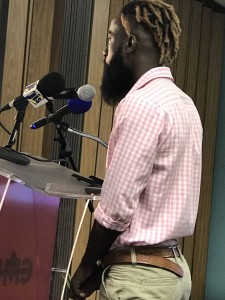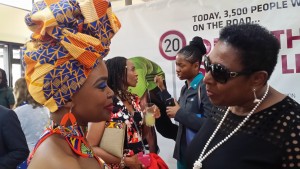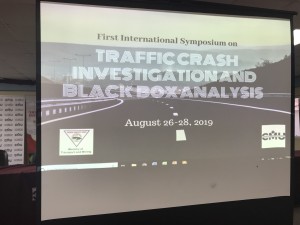
Road Safety Seems to be More About Roads Than People. Correct Me If I’m Wrong.
January 17th, 2020
I tuned in to a live stream of a two-day conference co-hosted by the World Bank and the WRI Ross Center for Sustainable Cities in Washington, DC this week. It is an annual event under the umbrella of Transforming Transportation 2020. This year’s theme was “Connecting People for Sustainable Growth.”
So, how did the agenda look? Zoleka Mandela, a passionate advocate for road safety, got fifteen minutes for a “Fireside Chat” on the topic. Then there was one and half hours of a session headlined rather casually, Still 1.35 million Deaths Too Many: What is the Road Safety Plan to 2030?
The panelists at the road safety session were Kelly Larson, Program Director, Bloomberg Philanthropies Initiative for Global Road Safety; Boboye Oyeyemi, Corps Marshal, Federal Road Safety Corps, Nigeria; JSR Kutty, Head, Vehicle Attributes and Technical Services, ERC, Tata Motors Limited; Leena Nandan, Special Secretary, Ministry of Road Transport and Highways, India; Jeff Michael, Secretary, Third Global Ministerial Conference on Road Safety; and Ernest Loevinsohn, Executive Director, Fund for Global Health. It was a parallel session, and the room appeared half-full as other participants were at different sessions.
Yes, there are 1.35 million deaths and 50 million injuries due to road crashes every year, globally. However, in the entire two-day conference, barely two hours were devoted to the topic of road safety.
I have to confess that I was a little disappointed. The theme did include the word “people.” However, 90 percent of what I listened to (which was most of one afternoon) was about money, statistics, and roads. Important, yes – but I wanted to hear much more about the enormous human costs of road crashes (do not use the word “accidents,” it was pointed out). Perhaps this is not a priority of the World Bank.
To my mind, the one panel devoted to road safety could have been so much more meaningful.

Maleek Powell, whose sister had been killed in a road crash a few weeks earlier, spoke eloquently at the road crash investigation conference last year. He has since become an advocate for road safety. (My photo)
In my view, the discussants should have included a road crash victim, whose life has been impacted; an advocate such as Ms. Mandela (whose daughter was killed by a hit-and-run driver as she tried to cross a busy road); a health care worker in an A&E Department at a busy hospital; a first responder – a firefighter, policeman, ambulance driver; the relative of a person killed in a car crash, talking about the impact on the family; a young person (what a novel idea!); a representative of an organization that works with senior citizens, people with disabilities, and children, who are all highly vulnerable road users and often victims; and an advocate for cycling and non-lethal forms of road transport, perhaps. These are just my suggestions.
If, as the Conference pointed out, “93 percent of road crashes are in the developing world,” the entire panel (except perhaps one person) should have been made up of people from the developing world.
And if, as was also noted, “Road crashes are the leading cause of death among people aged five to 29 years old” globally – there should have been at least one young person on the panel.

Road safety advocate Zoleka Mandela (left) speaks with Minister of Culture, Gender, Entertainment and Sport Olivia Grange at a high-profile event at the Office of the Prime Minister in May, 2017. Despite the wonderful speeches made on that occasion, deaths on the road have soared since then. (My photo)
In case you are wondering (and you would be forgiven for not noticing, since most of the headlines have been gobbled up by party politics and crime, as usual) – nineteen Jamaicans have already been killed on the roads in 2020 – that is, in seventeen days. One guesses that there have also been injuries. This means that at least nineteen families have been broken, lives turned upside down. Dozens of Jamaicans are already in shock and mourning. Many are already suffering and in pain, dependent on others to care for them. And the financial toll – hospital treatment, funeral costs and so on – is probably already in the millions. Productive, income-earning lives are lost. Breadwinners are snatched away; young people’s potential is gone in the space of a couple of seconds (literally; that is how long a crash takes to happen).
And yet, local media coverage of these issues is scant, to say the least; road crashes are really only reported in any detail in Jamaica if there is an “important person” involved. At an excellent regional workshop hosted by the Inter-American Development Bank (IDB) last year, there were no media representatives at all.
The World Bank discussion was not valueless. However, it seemed to be somewhat lacking in humanity. One observation that was strongly emphasized towards the end by the Indian panelist, however, rings loud and clear:
If we don’t have complete leadership from the top, we will continue passing the buck to each other.
Our Prime Minister chairs the National Road Safety Council. The buck stops with him. So over to you, Mr. Holness!

Only JIS briefly covered this ground-breaking regional conference, the first of its kind, which took place last year under the auspices of the Road Safety Unit. Civil society organizations were also largely absent. (My photo)
Tags: Andrew Holness, Caribbean, India, Jamaica, Maleek Powell, National Road Safety Council, NGO, Prime Minister, road safety, Road Safety Unit, sustainable development, Transforming Transportation 2020, United States, Washington DC, World Bank, Zoleka Mandela
The Gleaner reserves the right not to publish comments that may be deemed libelous, derogatory or indecent.
To respond to The Gleaner please use the feedback form.
4 Responses to “Road Safety Seems to be More About Roads Than People. Correct Me If I’m Wrong.”
- We Are the Zoomers
- Living Online with Humans and Birds: NAOC 2020
- Human Trafficking and the Problem of Public Education
- Down Memory Lane
- Are We Ready to Recover from COVID-19?
- Road Safety Matters: Is Your Vehicle Safe?
- Sexual Harassment, Me Too, and the Minister’s Disturbing Giggle
- The Vulnerable Senior Citizens, Private Care Homes and COVID-19
- A Muddle Over Masks
- Here is Something Life-Saving You Can Do: Give Blood!



I am in total agreement with you – I live in Florida which has one of the worst pedestrian safety records and it is hard to enforce safe road use by both peds and vehicles. It is a sad situation all around and my observation is that educating the public does not work . It has to come down to enforcement .
I think enforcement plays a critical, critical role, I agree. I was extremely disturbed when our local law enforcement actually did not show up at an IDB regional workshop on road safety last year. Their counterparts from Belize, Trinidad, Guyana and elsewhere were there – and even presented – but Jamaica’s law enforcement was a no-show, right here in Kingston!
One could also argue for inclusion of people responsible for road accident as a rider or driver, especially if not DUI or a victim who caused an accident…
Media always wants a ‘story’ and the high numbers in JAMAICA render stories harder to find. Also, few in media want to deal with issues and accountability unless it is easy finger pointing.
Yup, there was a CRASH (not accident) recently where it seemed the deceased victim was at fault. Well, it happens often I suppose. There are many “stories” to be found behind the statistics though, I think (hard to find? I’m not sure about that). The media can’t be bothered to find them, though.